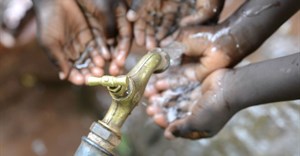
How load shedding is threatening South Africa's water security

According to the National Water and Sanitation Master Plan, non-revenue water in municipalities - water that is pumped and then lost or unaccounted for - is estimated at 41%. South Africa is losing roughly 1,660 million cubic metres of water a year - largely to leaks - which is equivalent to approximately R9.9bn per annum down the proverbial drain.
"If we continue on this path, we're going to be losing more money - money that we as South Africans can use," said Odwa Badi, researcher: senior civil engineer at the Council for Scientific and Industrial Research (CSIR), during a media briefing hosted by the organisation.
With agriculture and municipalities (residential and commercial use) accounting for 88% of water consumption, water security is a particularly important discussion, Badi said, as apart from water authorities having to fulfil their Constitutional mandate, water accessibility also impacts food security and economic activity in the country.
Load shedding adding to water woes
Adding to its growing list of casualties, ongoing load shedding is adding to our water woes, impacting the country's water facilities, regularly interrupting supply to consumers. Badi unpacked why water outages sometimes closely follow load shedding, as well as the broader impact on infrastructure.
Power, he explained, is required to pump water from low-level sources, such as rivers, to consumers who are situated higher up. During load shedding or when the electricity trips, pumping to the reservoirs on that particular grid stops, affecting supply. But there are also, at times, significant consequences for the water infrastructure, he noted.
Damage to the pump and even an entire pump station could occur due to an electrical surge or a hydraulic surge, which occurs when a column of water returns to the pump at a high velocity, Badi explained. And the costs associated with this damage can sometimes run into tens of thousands of rands.
Securing SA's water infrastructure
Safety and security is another, albeit rarely considered, factor when it comes to the impact of load shedding on water supply, he noted, but it is extremely important as some reservoirs are very isolated. "They are at risk of being vandalised, so that's why you need lighting and adequate electricity for the instrumentation, and so that you can have appropriate security personnel," he said.
Electricity is also needed within reservoir sites to power the instrumentation that measure and maintain water levels, ensuring they do not overflow into neighbouring communities, he explained, and to support the efficient operation of the infrastructure, limiting water wastage.
"We, as South Africans, are, I think we cannot dispute, in trouble in terms of water supply and in terms of electricity supply. I think it's important then for us to focus on coming together and discussing solutions on how we can mitigate this," Badi said.

About Sindy Peters
Sindy Peters (@sindy_hullaba_lou) is a group editor at Bizcommunity.com on the Construction & Engineering, Energy & Mining, and Property portals. She can be reached at moc.ytinummoczib@ydnis.
















